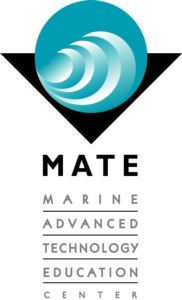
The remotely operated vehicle competition sponsored by the Marine Advanced Technology Education (MATE) Center has a pivotal role in two movies and a new book. It is the backdrop for Spare Parts, a feature film being released in January, a new book with the same title, and Underwater Dreams, a documentary released in theaters this past summer.
The central plot feature of all these works is MATE’s remotely operated vehicle (ROV) competition in 2004 when the underwater robot constructed by a team of immigrant Hispanic students from a Phoenix high school beat other high school, community college and university teams, including the Massachusetts Institute of Technology.
Jill Zande, MATE’s associate director and coordinator of the center’s ROV competition, is working with the feature film’s marketing team to attract attention to the center’s educational activities and marine technology careers.
“We’re excited that the films and book are calling attention to STEM programs and the powerful impact that they can have on students and student learning. They also demonstrate what students—no matter what their background or socioeconomic status—are capable of when given the opportunity," Zande said.
The MATE Center’s Facebook page currently includes a video summary of the 2004 competition (Carl Hayden Community High School's champion ROV appears at 4:12).The trailer for the Hollywood version starring George Lopez, Carlos PenaVega, Jamie Lee Curtis, and Marissa Tomei is online too.
Nine months after the 2004 competition WIRED magazine published an article about the underdog team’s victory. The undocumented status of three of the four team members (one team member was a U.S. citizen at the time of the competition) and the financial challenges that imperiled their college aspirations were emphasized in Joshua Davis’ article. An editor’s note with the Dec. 2 online reprint of the original article reports that WIRED readers contributed $90,000 to help the team members—Oscar Vazquez, Lorenzo Santillan, Luis Aranda, and Cristian Arcega— attend college.
Another WIRED autopia article explains what the team members are doing now. Their lives are also the subject of the Davis’ new book Spare Parts: Four Undocumented Teenagers, One Ugly Robot, and the Battle for the American Dream. It is an Amazon Book of the Month in December and was Amazon’s number one bestseller in the Hispanic American demographic in mid-December.
Scientific American has also published an interview with Davis and Vazquez. Since the first WIRED article Vazquez has earned a mechanical engineering degree from Arizona State University, returned to Mexico to apply for legal entry to the U.S., got assistance with immigration authorities from Illinois Senator Dick Durbin, and served in the U.S. Army in Afghanistan. WIRED reports he is now a mechanical foreman for a railroad in Montana.
Underwater Dreams, the Mary Mazzio documentary currently showing at college campuses and other venues on a 100-city tour, focuses on the outcomes of the team’s victory and compares how the Carl Hayden and MIT students have fared. While promoting the documentary, Mazzio and Vazquez were interviewed on The Colbert Report.
Zande, who is also co-principal investigator of the MATE Center at Monterey Peninsula College in Monterey, California, is happy that the center is sharing in the limelight. She hopes the movies and book get more students interested in the ROV competition and marine technology careers.
While the Carl Hayden High School team’s victory was excellent, Zande said every ROV competition has unique human interest stories of individuals and teams overcoming obstacles just to make it to the competition.
The credits for the Spare Parts movie will include the MATE Center as well the National Science Foundation (NSF) and the Marine Technology Society (MTS), which have been key funders of the ROV competition for all 15 years of its existence. The MATE Center’s Advanced Technological Education grant from NSF provides the financial support to create the curriculum and educator professional development programs for marine technology programs; the ROV competition is designed to recruit students, particularly underrepresented minorities for the marine technical workforce. MTS and its members volunteer their time and contribute financially to support U.S. regional ROV competitions and the international final.
Zande said she was “shocked and surprised and dismayed” that neither the National Science Foundation nor the Marine Technology Society were mentioned in WIRED. In the 2005 article author Joshua Davis refers to the competition’s sponsors as NASA, which has provided facilities and in-kind support to MATE’s ROV competition, and the U.S. Navy’s Office of Naval Research, which provides judges. The feature film’s marketing team explained it kept these references because most members of the general public know NASA and the Navy but are much less familiar NSF and MTS.
Other instances of poetic license have Zande offering clarifications of details that got lost in the after-the-competition translation of facts into mass media pieces that are nevertheless useful for attracting kids to STEM.
For instance, the WIRED article includes dialogue between the judge and Carl Hayden team members about why they did not have a PowerPoint. MATE Center does not allow its competitors to use PowerPoints for two reasons. MATE Center leaders want the students to experience one-on-one conversations with the judges when they explain their ROV designs, and the spaces available for the judges to talk to the teams often cannot accommodate PowerPoint presentations.
Based on current registrations, Zande expects 3,600 students from middle schools to universities to participate in upcoming regional competitions and the 2015 international competition in June at the Marine Institute in St. John’s, Newfoundland, Canada. For more information about the 2015 competition see http://www.marinetech.org/rov-competition/

 Subscribe
Subscribe


 See More ATE Impacts
See More ATE Impacts

Comments
There are no comments yet for this entry. Please Log In to post one.